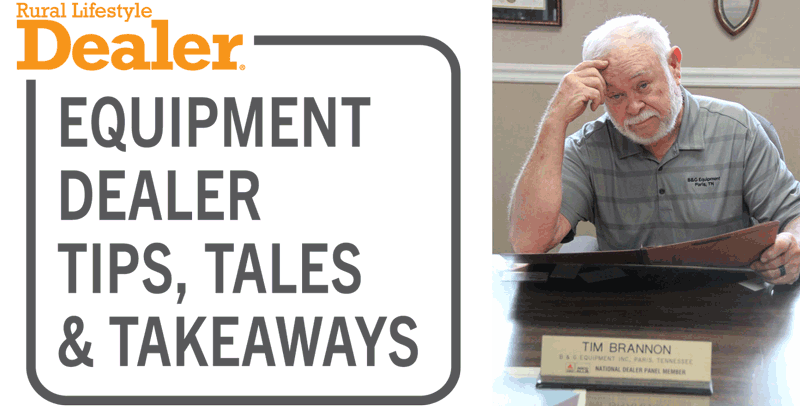Today, every news show mentions the dreaded, impending “recession” — depending on one's definition of recession. There may be a recession, however, looking back, the ag economy in the 1980s was a depression.
How those of us who survived that depressive, devilish, deadly decade (I learned alliteration at Murray State) with our dealerships intact is still a mystery. It took two hands to turn the key in the door every morning as it was a daily nightmare that awaited. Bankruptcies, falling land prices, past due accounts receivables, past due machinery accounts, floorplan curtailments, dumping new and used equipment at huge losses, pressure from the manufacturers to order new equipment to keep the factories running (thus exasperating the problem), grain prices below production costs. And the trigger was an American President who made a foot soldier of the American farmer via a grain embargo to Russia.
Oh, and I forgot repossessions (that we stood recourse on) that flooded the used market and our lots. The repos were worth on average about half what the payoff was. Farm estate sales were a weekly occurrence.
Then, the rural banks started to fail or exit the ag lending market and the Production Credit Associations (PCAs) foreclosed on past due farmers with positive net worth while at the same time unfairly extending upside-down producers. Sometimes there were two foreclosures or quitting auctions happening per week.
Our floor plan interest hit 20%-plus. Farm programs tried to limit production by having farmers cut acreage by 10%, farmers took the worst land out of production and STILL produced more grain that further flooded the markets.
I remember the FFA creed’s line of "I believe in the future of farming" – but we actually seriously doubted this during the 80s.
Finally, the equipment dealers and manufacturers started to fail, close the doors and or drastically cut back their operations. The 80s depression left virtually no manufacturer unscathed.
“I remember the FFA creed’s line of ‘I believe in the future of farming’ … But we actually seriously doubted this during the 80s...”
The only major OEM that survived was Deere. How? Deere, in the 60s and 70s, demanded earnings be retained in the dealership. Their dealer organization was more populous and thus began being better capitalized – this has been the official line.
International Harvester (IH) realized what was happening and started the X-L Program, Allis-Chalmers (A-C) followed suit and had Action-Eighty; both programs to mimic Deere's dealer improvement program. It was too little too late. My boss told me as an A-C rep "Don't worry about this, son, it is like closing the gate after the horse is out.” He was right.
Deere's head, Hans Becherer reaped the reward of a pretty much hated, authoritarian, dictation of a dealer organization. We do not think he saw the future; rather they were striving to be the lowest cost producer in the industry and this took economies of scale through increased sales. The unintended result probably saved the company from the fate of all others.
I submit during that time that Massey Ferguson (MF), A-C, IH and all the other brand dealers put a significant amount of profit into farms or other businesses, we can name many who did. When crunchtime came, if the dealer had a farm or other business or a better, less stressful job, they simply chose to close the dealership. Case's James Ketelsen was “the man” that moved Case, IH and later NH together; his tenure in the ag industry was monumental – as they say – an interesting read.
AGCO came after Deutz bought A-C, and that resulted in the purchase of MF, White, Hesston and a slew of others under the AGCO umbrella. We will visit that story later. There was carnage and devastation in the farm equipment market. Rumors ran rampant and one never knew what would be in the next registered letter or a phone call -- we got them regularly.
A lot of days ended with "Other than THAT, Mrs. Lincoln, how did you enjoy the play?"
Not very many smiles or prosperity this time around, but it gets better!
New Standing Blog Series in Rural Lifestyle DealerTold from the perspective of an in-the-trenches owner/operator — Tim Brannon of B&G Equipment, Paris, Tenn. — Equipment Dealer Tips, Tales & Takeaways shares knowledge, experiences and tips/lessons with fellow rural equipment dealerships throughout North America. Covering all aspects required of an equipment dealership general manager, Brannon will inform, entertain and provide a teachable moment for current — and future — leaders within equipment dealerships. |
 |
More From Tim Brannon
- Communications: Now Repeat What I Just Said ...
- Loaded Up & Ready to Go
- Twas the Week Before New Year
- No Easy Way Out
- How to Sell Series: Grow Your Off-Season Service Business
Equipment Dealer Tips, Tales & Takeaways is brought to you by the Solectrac.
It’s Solectrac's mission to lead the transition to zero-emissions regenerative agriculture, and utility operations with best-in-class technology for a safer, cleaner and healthier future.







Post a comment
Report Abusive Comment